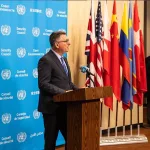Israel Working to Meet UN Stockholm Convention Standard on Pollutants
As part of the State of Israel's preparations for ratifying the UN Stockholm Convention, the Ministry of Environmental Protection published ...
Jerusalem, 16 July, 2025 (TPS-IL) — As part of the State of Israel’s preparations for ratifying the UN Stockholm Convention, the Ministry of Environmental Protection published for public comment the draft Hazardous Substances Regulations (Implementation of the Stockholm Convention on Persistent Organic Pollutants), 2025.
The regulations proposed by the Ministry, it said, would allow Israel to move forward towards ratifying the convention, and would impose restrictions on the use of the first 12 pollutants included in it and four PFAS compounds – hazardous substances about which a great deal of information has been accumulated in recent years. Until recently, the convention included 34 pollutants, and in May 2025, it was decided at the convention’s discussions in Geneva to add three additional pollutants.
In order to ratify the Convention in Israel, comprehensive professional work was done to map the Convention’s requirements against the current situation in Israel. It was found that Israel generally meets the standards set out in the Convention with regard to many aspects, through existing regulatory tools. However, it was found that there are certain gaps in relation to the Convention’s requirements, in the absence of appropriate authorities to restrict and prohibit the production of pollutants listed in the Convention (including mixtures), trade in them and their use. Hence the need to enact regulations that impose restrictions on dealing with persistent organic pollutants.
The Stockholm Convention is designed to globally restrict the production, import, export and use of persistent organic pollutants (POPs). These substances are particularly toxic, accumulate in the human body and in the environment over time, pose a health risk, and include, among others, pesticides, flame retardants, industrial adhesives, and materials in the plastics and textile industries. Israel signed the convention in 2001, but has not yet ratified it – and is one of the few OECD countries that has not yet done so.























